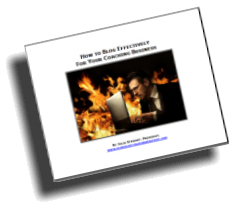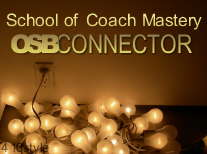 If you're a smart coach, you've learned that 'free' can be priceless.
If you're a smart coach, you've learned that 'free' can be priceless.
Free is an attraction magnet and one of the smartest ways to market. That's why savvy coaches give away free sessions and other attractive stuff. 'Free' leads to relationships and relationships lead to clients.
Coaches didn't invent 'free', of course. We are also the happy beneficiaries of many free tools that make starting a coaching business one of the least expensive businesses you can get into.
Another lovely development is that online tools are getting easier to use.
Here without further ado are a few of my favs (plus a nice freebie from us).
1. Gmail. Every online business owner answers email pretty much all day. What a delight to have email that is virtually SPAM free without ticking off your potential clients by forcing them fill out a SpamArrest Captcha box before they can even contact you (really bad for business, by the way). Gmail is free and comes with loads of storage. It's online, so you're computer never slows down while it's downloading your (spam) email into Outlook. [UPDATE 10-21-09: You can also upgrade to Google Apps Standard for free and use your website address as your email domain.)
2. Google Reader. While we're in Google land, here are a couple more items that are helpful. Other people's blogs are among the most valuable free resources you'll find on the web, but most folks haven't figured out the whole RSS subscription thing. That's a pity, but good news! Google Reader is to blogs what AOL was to email ten years ago. Suddenly those of us who are clueless can join the party, too. Better yet, Google Reader is free.
Question: when you click one of those little orange RSS buttons  that you see on blogs, do you know what to do with all that code that comes up? Me either. RSS stands for 'really simple syndication', but in my opinion, that was a misnomer until Google invented Reader. Now you can copy a blog's website address and paste that into your little Reader subscription box and all the articles will show up there automatically. If you can read email, you can subscribe to blogs with RSS in Reader.
that you see on blogs, do you know what to do with all that code that comes up? Me either. RSS stands for 'really simple syndication', but in my opinion, that was a misnomer until Google invented Reader. Now you can copy a blog's website address and paste that into your little Reader subscription box and all the articles will show up there automatically. If you can read email, you can subscribe to blogs with RSS in Reader.
3. Flickr Creative Commons. Let's say you've gotten so comfortable with blogs that you are now blogging regularly yourself (good idea, by the way). Blog posts are more likely to get read when they include engaging pictures. You can download digital photos from many paid sites (I like Dreamstime*), but if you're blogging every other day or so (good idea, by the way) even a dollar per picture adds up.
Flickr Creative Commons allows you to download thousands of pictures freely. The 'Free Hugs' photo above is an example. Just do the right thing and credit the photographer in your post. (Free Hugs Photo by Kalandrakas)
4. Social Networking sites. A blog is a great way to communicate with your fans, but how do you attract fans, in the first place? One way is via social networking. The most popular sites for coaches are Twitter, Facebook, and LinkedIn. And they are free. Or you can go for a much more targeted site like, Mastery Coach Exchange. Free again. Add badges from your favorite social networking sites to your blog, as we've done here, and keep the flow of traffic moving to your site.
5. Bit.ly. To invite people to your site, you need to post links. But links can be pretty cumbersome, especially if there is a limit to how long posts can be (as they are on Twitter). You need a link shortening service. There are many out there to choose from. I used to be loyal to Tinyurl and it's still great, but Bit.ly has some extra bells and whistles that are especially nice. My favorites include the ability to post directly to Twitter from Bit.ly and the ability to track how many people clicked a particular link. Makes it easy to gage which projects are most attractive to my fans.
6. Topify. Another tool that I like to use with Twitter is Topify. Once you set up and account with Topify, you'll receive an email each time someone follows you on Twitter. Topify with share enough info about your new followers that you can decide whether you want to follow them back, block them from following you, and/or report them as spammers.
Most people think that having lots of people follow you is the name of the game on Twitter. Actually, the quality of your followers is far more important. If you're not paying attention to who's following you, you'll likely get a lot of porno-spammers and some very weird tweets. (By the way, I learned about both Bit.ly and Topify from @DannyBrown, who is a heck of a nice guy to follow on Twitter. If you like, you can also follow me at @MasteryCoach.)
7.MailChimp*. Now that you have some quality followers, you want to invite them to something. Make that something wonderful and you may develop some raving fans. Fans become clients. MailChimp is an email marketing and list manager that offers a free account for email lists up to 500. Use a bit.ly link to invite your social networking followers to sign up for your free newsletter (or whatever) and manage that in MailChimp for free until your list gets really big and then you start to pay something. (By then, your client's fees will more than pay for the service.)
8. SurveyMonkey. Good marketing is about listening even more than expressing (just like good coaching). And you don't stop listening just because your list grows. You just need more efficient ways to listen to your fans. Surveys are a great way to do this. SurveyMonkey is well-designed and unless you're using it constantly, like we do (Our Coach 100 Feedback Forms are on the SurveyMonkey platform, for instance) the free SurveyMonkey account will be plenty.
9. Teleconferencing. Another great way to communicate with your fans (and have something to invite them to) is by doing teleconference calls. There are a plethora of free teleconference services out there that have an impressive array of features.
Two that we like are FreeConferencCalling, which lets you record in MP3 for free (great for preparing your coaching sessions for IAC Certification) and even has a nice button player for your website; and then there is FreeConferenceCall, which has an 'audiopodium' feature, if you just want your participants to be able to use a telephone to call into the recording. (If you're ready to get serious about creating digital products out of your conference calls, you may want to step up to AudioAcrobat* for your recording needs. It is not a free service, but it does have a free trial. And if you want a teleconference line with more bells and whistles, MaestroConference* has a free trial, too.)
10. DimDim*. Webinars have many advantages over teleconferencing. A recorded webinar makes a attractive movie, for instance, that you can embed on your site, blog or even YouTube. I've tried all the webinar services out there, including WebEx, InstantTeleseminar, and GoToWebinar. I think none compare to DimDim and the free version may be all you'll ever need. It even comes with a free teleconference line, if you want to do tele-webinars.
11. BaseCamp*. You can use Dimdim to collaborate with a group of people from around the world, but if you do a lot of collaborative projects, you may want BaseCamp, an awesome suite of tools from the folks at 37Signals. Very simple, clean neat tools for getting projects done efficiently. Who couldn't use more of that? And the free version is very robust.
12. Pulse. Hate Quicken and QuickBooks? Me too. But you still need to track your finances. A simple tool that tracks your cash flow, Pulse creates graphs and multiple views of your financial picture, so you can see where you are today, make projections into the future and sleep better at night. The free version is very nice and it works with BaseCamp, too.
13. PayPal*. Paypal used to be seen as a tool for amateurs, but boy, has it grown up. Setting up a basic Paypal account is still free. Note however, that when people pay you, Paypal will take a small percentage. All merchant gateways will do this, but most will charge some hefty fees upfront, as well.
The thing that's great about Paypal is that it can grow with you. Over time, when you need invoices, website buttons, subscription services, take payments over the phone, accept all major credit cards, plus debit cards and checks, Paypal can do all that and create reports for your accountant, too. You can learn as you go and if you want an alternative payment service, you can always add one, but some people like to pay directly from their Paypal accounts, so you may want to keep it. (At some point, you may need an online shopping cart to automate most of your business transactions. We use 1ShoppingCart* for this and it has a free trial. It integrates with Paypal and other merchant gateways.)
14. BigMind. So far, I've focused on business solutions that you can try out for free, but of course, every great coach has also done their personal development work. It's part of the job description. That could be another whole blog post, but today I'm highlighting my favorite free personal development resource. All this week, you can watch live streaming video of Genpo Roshi taking a group of retreat members through the Big Mind/Big Heart Process for free. Live participants paid hundreds of dollars to be there (I'll be there in November), but you can be 'there' for free.
The difference between this Genpo Roshi free program and the free teleclass programs that I warned you about in a previous post, is that this is an advanced, in-depth program that is not designed to manipulate you into buying something, but is focused simply on providing value. Big distinction.
15. And of course, the School of Coaching Mastery has tons of free resources for you, too. Videos, audios, eBooks, free webinars, study groups and even our own social networking site. Just explore the site and blog and you'll find them. One resource that is particularly powerful is the 'Become a Coach!' eBook, which contains an 8-hour free coach training program. Again, this is not just a free informercial teleclass, but a real training program, for free.

Don't expect everything to be free of course. When it comes to your business, learn to pay for the stuff that helps you make more money. But try it for free, first.
* Disclosure: I'm an affiliate of this company. And I would recommend it, anyway.
Free Hugs Photo by Kalandrakas Gregory Schillinger was one of the first coaches to take a chance on School of Coaching Mastery three years ago.
Gregory Schillinger was one of the first coaches to take a chance on School of Coaching Mastery three years ago.


 Have you ever wished you could get insider tips on how to succeed at something?
Have you ever wished you could get insider tips on how to succeed at something? 



 If you're a smart coach, you've learned that 'free' can be priceless.
If you're a smart coach, you've learned that 'free' can be priceless.



 We've been working on a new digital product for coaches called, Master Coach Demos.
We've been working on a new digital product for coaches called, Master Coach Demos. Many people find it really hard say "no". And, as you probably know, some people are harder to say "no" to than others. But not saying "no" when you need to can absolutely ruin your life, so it's important to learn to do it right.
Many people find it really hard say "no". And, as you probably know, some people are harder to say "no" to than others. But not saying "no" when you need to can absolutely ruin your life, so it's important to learn to do it right.

